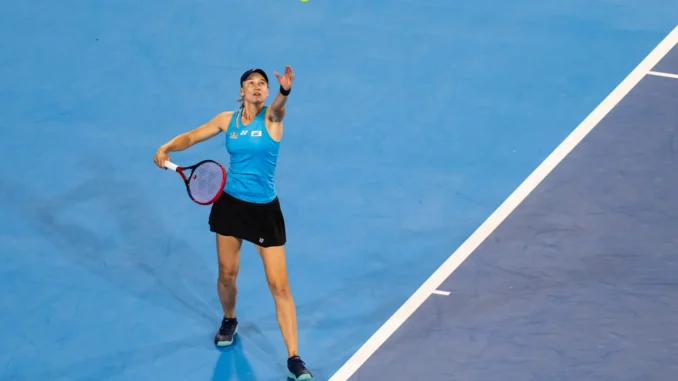
In a gripping second-round match at the 2025 Cincinnati Open on August 11, Elena Rybakina, the 2022 Wimbledon champion, faced Elise Mertens in a contest that pushed her resilience to new limits. The Kazakhstani star emerged victorious with a 6-4, 6-7(5), 6-3 scoreline, but the match was overshadowed by an extraordinary personal challenge: an astonishing number of double faults that Rybakina described as a career first. “In the first set I struggled a lot. I think I never did so many double faults,” she admitted post-match, her voice a mix of relief and reflection. “Something for me to learn. Happy in the end I managed to find my game. Thank you so much guys for staying so late.” The victory, hard-fought over nearly three hours under the Ohio night sky, showcased Rybakina’s grit but also highlighted a rare vulnerability in her usually formidable serve, leaving fans and analysts buzzing about her performance and its implications for the US Open.
Rybakina, ranked No. 11, entered Cincinnati on the heels of a rollercoaster season. After clinching her ninth WTA title in Strasbourg in May 2025, defeating Liudmila Samsonova in a three-set thriller, she suffered setbacks, including a fourth-round loss to Iga Świątek at the French Open and a third-round upset by Clara Tauson at Wimbledon. Her powerful serve, often clocking up to 127 mph and leading the tour with 192 aces in 2020, has been her hallmark, but injuries and coaching controversies have disrupted her rhythm. A back injury sidelined her earlier in 2025, and the WTA’s 12-month suspension of her coach, Stefano Vukov, for alleged misconduct added off-court drama. Despite rehiring Vukov in January, Rybakina now trains without an official coach, relying on interim support from Yuri Schukin and her team, which may have contributed to her inconsistent play in Cincinnati.
The match against Mertens, a seasoned Belgian ranked No. 35, was a test of endurance and adaptability. Rybakina’s first set was marred by an uncharacteristic 10 double faults, a number she later said she had “never experienced before” in her career. The blazing Cincinnati sun, which she noted had affected her in her previous match against Renata Zarazúa, compounded her struggles. “In the first set the sun hit quite badly on me. I honestly didn’t feel well,” she had said after defeating Zarazúa 4-6, 6-0, 7-5 on August 9. Against Mertens, the first set saw her serve falter, with only 41% of first serves landing, allowing Mertens to capitalize on early break points. Yet, Rybakina’s aggressive baseline game—marked by flat, powerful groundstrokes—secured a 6-4 win in the opener, despite the errors.
The second set was a rollercoaster, culminating in a tiebreak where Mertens’ resilience shone. Rybakina, visibly frustrated, looked to her box in disbelief as Mertens leveled the match 6-7(5). “I was focusing on the serve,” Rybakina later explained, acknowledging the mental shift needed to regroup. In the third set, she found her rhythm, reducing her double faults and leaning on her 6.1 aces per match average to close out the set 6-3. Her ability to adapt under pressure was evident, as she converted 75% of her first-serve points in the decider, a stark contrast to the first set’s woes. The Cincinnati crowd, staying late into the night, roared their support, which Rybakina gratefully acknowledged: “Thank you so much guys for staying so late.”
This match followed a challenging first-round win over Zarazúa, where Rybakina overcame a 4-6 first-set loss and 15 unforced errors to dominate the second set 6-0 and edge the third 7-5. “Renata played really well,” she noted, crediting her opponent’s tenacity. Her ability to battle through physical discomfort and a high error count—more unforced errors in the first set than the second and third combined—underscored her resilience. Against Mertens, the double-fault anomaly became the focal point, with fans on social media platforms marveling at her recovery. One post praised her “incredible resilience” in turning the match around despite the serving woes.
Rybakina’s Cincinnati performance reflects her 2025 season: a blend of brilliance and inconsistency. Her 17-5 record since Strasbourg, including a semifinal run at the DC Open where she fell to Leylah Fernandez in a three-hour epic, shows her potential to reclaim a top-10 spot. However, early exits at Indian Wells, Miami, and the French Open highlight the challenges of managing injuries and coaching transitions. Her powerful game, built on a relentless serve and flat groundstrokes, thrives on hard courts, where she boasts a 71% win rate in 2025. Yet, the double-fault surge in Cincinnati—likely exacerbated by fatigue and the absence of a stable coaching setup—signals areas for improvement as she eyes the US Open.
The Cincinnati Open, a key US Open tune-up, has been a mixed bag for Rybakina. In 2024, she reached the quarterfinals but fell to Madison Keys. This year, her win over Mertens sets up a third-round clash, potentially against Keys again, offering a chance to build momentum. “I’m happy that I’m ready to play these long matches,” she said after her Montreal quarterfinal, reflecting on her physical progress. The double-fault ordeal, while unprecedented, is a learning opportunity for the 26-year-old, who remains a formidable contender when her serve clicks. As she navigates the hard-court swing, Rybakina’s ability to harness her aggressive style and overcome setbacks will determine whether she can add to her Grand Slam tally in New York.
Leave a Reply